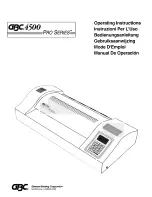
I M P O R T A N T S A F E G U A R D S
9
SAFETY SYMBOLS USED ON THE LAMINATOR
IMPORTANT! Read and make sure you understand
these safety and operating guidelines.
Rotating Parts: Risk of Injury
Failure to use caution near rotating
rollers could result in physical injury.
Be careful that items such as loose cloth-
ing, long hair and jewelry do not
become entangled in rotating parts.
The laminator is equipped with photoelectric eyes to pre-
vent contact with the rotating rollers. Make sure that these
safety provisions are always in operation/installed.
IMPORTANT! The laminator operation will cease
immediately when the photoelectric eyes, set directly
in the path of the front and back of the rollers, are
blocked. THIS WILL NOT HAPPEN when using the
footswitch in which case a BUZZER will sound and
the laminator runs in slow mode at a rate of 2.0-ft
(0.6m) per minute.
Hot Surface: Risk of Injury on Contact
The laminator contains a heated top-
roller, which may reach temperatures
of 275°F (135°C). There is a danger
of severe burns if the heated top-roller
is touched during use. Even after
switching off the laminator, the roller
remains hot for a long time.
Electrical Parts – Danger of being injured by
electricity.
Do not open the locked doors because
of the risk of being injured by voltage.
Only authorized maintenance and ser-
vice technicians or safety personnel
should have access to the keys for
mechanical upkeep or repair.
WARNING! Make sure the door interlock on the left-
side cabinet is disengaged when opening the right-side
cabinet door for any maintenance. The door interlock
automatically shuts the laminator power off when the
door is opened.
IMPORTANT! Do not place heavy objects on the
power supply cord.
PREVENTATIVE MEASURES:
Do not feed objects such as staples, paper clips and rough
or abrasive materials through the laminating rollers.
Keep all objects, such as tools, rulers, pens, markers or
knives away from the roller opening. Refrain from leaving
such items on the front table to prevent them from acci-
dentally being fed into the rollers.
IMPORTANT! NEVER cut or slice directly on the
rollers as any cuts or gouges will destroy them. ALWAYS
use cutters with enclosed blades to prevent cutting the
rollers and to avoid extensive replacement costs.
WARNING! Always adjust the shim wheels to create a
gap between the laminating rollers to prevent flat spots
from developing when the laminator is not in use. Flat
spots will affect the quality of the output and void the
warranty replacement.
IMPORTANT! The main roller should be down and
turning while heating up to prevent uneven hot spots
on the roller. A stationary roller will develop concen-
trated heat in one area, which will damage the roller.
SERVICING AND REPLACEMENT PARTS
Service and maintenance must be performed fully in
accordance with the instructions. Servicing by any
unauthorized technician voids the warranty. The service
technician must use replacement parts specified by
SEAL Graphics.
Service Technicians must perform safety checks after
completing any service or repairs to the laminator.







































